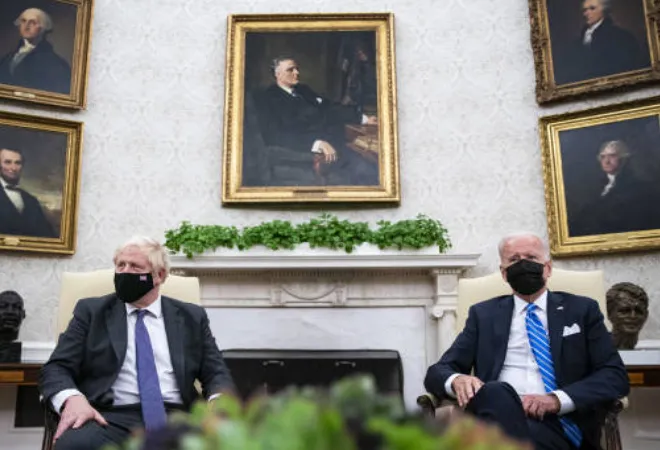-
CENTRES
Progammes & Centres
Location
After a tumultuous start with the new Biden administration over the Afghanistan crisis, the UK is back on track as it renews its alliance with the US

The relationship between British Prime Minister Boris Johnson and United States (US) President Joe Biden has come a long way since Biden called his British counterpart “a physical and emotional clone” of former US President Donald Trump in 2019. As the memory of a strong camaraderie between Johnson and Trump remained fresh in the minds of the Biden administration, Johnson initially had sufficient reason to be worried about being left in the cold by Biden. Yet quite the opposite has manifested between the transatlantic allies since Biden’s take over in Washington. In his three-day tour to the US, Johnson first met Vice President Kamala Harris where he expressed his satisfaction with the increased cooperation and interconnectedness between the US and Britain. The two discussed critical issues such as tackling the pandemic, dealing with climate change, and upholding democracy around the world despite the West’s failure in doing so in Afghanistan, Iraq, and Libya.
Johnson aimed at securing US $100 billion per year from richer countries to help the poorer and smaller countries tackle climate change, pushed by the fear of witnessing the failure of the UK before the COP26 summit.
This tour is Johnson’s first foreign trip since his election, which is being interpreted as a diplomatic win for Downing Street citing Biden’s reluctance in meeting any leaders in New York at the United Nations General Assembly (UNGA). Johnson entered the US aiming to promulgate the UK’s climate hopes from the latter with COP26 being held in Glasgow at the end this month under the presidency of the latter. Before the trip, Johnson aimed at securing US $100 billion per year from richer countries to help the poorer and smaller countries tackle climate change, pushed by the fear of witnessing the failure of the UK before the COP26 summit. However, Biden doubled the US’ contribution to US $11.2 billion to lesser developed countries combatting climate change and the UK’s ambitions received further impetus when China announced the cessation of the construction of new coal-fired powerplant overseas. He urged the world leaders in New York to treat the UNGA summit as a turning point in humanity and come together to ‘blow out the candles of a world on fire’. His speech at the assembly, bizarre by many accounts, made a reference to Kermit the frog and his song “It’s not easy being green” where he declared the muppet was wrong as he aimed at stronger climate action policy in Glasgow to restrain the growth of global temperatures.
The British government, for two decades, has loyally supported the American-led coalition in Afghanistan despite receiving backlash from other major EU member states but America’s unilateral decision to withdraw from Afghanistan upset Downing Street as Johnson expressed his discontent and reflected on the US’ impotency in Afghanistan. The British MPs in the House of Commons vented their anger, grief, and rage at Biden’s decision to withdraw as the mood largely remained shameful and catastrophic as Britain’s requests to extend the withdrawal deadline was overlooked by the White House, signalling dependency on the US on autonomic matters. It was for the first time in decades that the UK and the US were publicly at odds with each other in the middle of a major geopolitical and humanitarian issue as the Afghan crisis marked a new low in the history of the “Special Relationship”, a term coined by Winston Churchill to attest longstanding ties between the transatlantic allies.
It was for the first time in decades that the UK and the US were publicly at odds with each other in the middle of a major geopolitical and humanitarian issue as the Afghan crisis marked a new low in the history of the “Special Relationship”, a term coined by Winston Churchill to attest longstanding ties between the transatlantic allies.
The relationship resurged in a matter of days with the formation of a trilateral security arrangement, “AUKUS”, involving Australia, the UK, and the US, where Australia’s ditching of the French coalition meant a coalition of traditional Anglo allies in the Indo-Pacific. Stephen Lovegrove, British National Security Adviser, has termed the pact as the most significant capability collaboration in the world as AUKUS now redefines security arrangements and coalitions in the Indo-Pacific to contain China’s expansionism. AUKUS has brought the traditional allies closer but has sparked a divide between Franco-British ties as France’s fury continues with the trio’s decision to abandon Paris in the Indo-Pacific. The French Foreign Minister Jean-Yves Le Drian and armed forces minister Florence Parly openly expressed disappointment at Australia’s decision-making to abandon France for AUKUS. Since the signing, France has recalled its ambassadors from Canberra and Washington, postponed the Franco–British Defence Ministers’ Summit, and will possibly delay the EU–Australia trade agreement negotiations. France views Britain as the junior partner in the special relationship with the US, thereby, reiterating the former British Prime Minister Tony Blair’s decision to support the US’s invasion of Iraq in 2003. Reacting to the French anger, PM Johnson responded by saying, “I just think it’s time for some of our dearest friends around the world to Prenez un grip (get a grip) about this and Donnez moi un break (give me a break).” De Gaulle’s 1944 perception of Britain remains largely relevant as he viewed Britain as a Trojan horse for American domination of Europe; however, contemporarily, by signing the AUKUS while undercutting France, the UK and the US have widened a historical rift between the European allies.
The other main agenda for Johnson before arriving in Washington was progressing the UK–US trade deal (UKUSFTA), which forms an integral part of Johnson’s Global Britain strategy. Since Brexit, the UK has treasured its freedom to pursue its bilateral trade deals as Britain has signed 69 trade agreements including one with the EU. The UK’s post-Brexit pivot away from Europe formulates an important strategy for Downing Street to increase its stature and role in the current international order. The UK–US trade agreement is seen as the jewel in the crown as the US is Britain’s largest export market with total trade accounting for US $57.72 billion.
AUKUS has brought the traditional allies closer but has sparked a divide between Franco-British ties as France’s fury continues with the trio’s decision to abandon Paris in the Indo-Pacific.
The negotiations of the trade deal began with the Trump administration; however, since Biden’s takeover in January, the negotiations have stalled as Biden administration’s attention and sense of urgency towards the UK-US trade deals is deflected by other major geopolitical and domestic concerns. Through the trade deal, the UK aims to garner easier access for financial services and lower tariffs on British Veblen goods, namely, Scotch whisky and cashmere wool whereas the US aspires for American firms to gain access to the UK’s healthcare and agricultural products, an area which lies at the core of the British economy, employing 1.5 percent of its workforce and using 69 percent of the country’s total land area. The US also lifted its two-decade-old ban on imports of British lamb and beef, which is a major respite for the poultry export business in the UK as the export industry is believed to be worth 66 million Euros over the next five years. British beef was banned by Washington in 1998 due to the outbreak of mad cow disease—a disease that slowly destroyed the brain and spinal cord in cattle.
Johnson is on point about Biden having “a lot of fish to fry”. Hence the UK has looked at other alternatives such as joining the US, Mexico, and Canada trade pact (USMCA), a successor of the North American Free Trade Agreement (NAFTA). The USMCA signed in 2019 modernises its predecessor by the inclusion of intellectual property and digital trade but the agreement has no provisions for accession by another country. The UK has pondered upon pursuing membership of the Comprehensive and Progressive Agreement for Trans-Pacific Partnership (CPTPP) after formally applying on 1 February 2021 as the UK purposes to renew its trade relations with 11 trading partners in just one negotiation. The rules of the CPTPP are set to be accepted by the UK while negotiating market accessibility bilaterally with other member states. Japan, the current chair of the CPTPP Joint Commission, has welcomed the UK’s application citing Britain’s importance as a strategic partner in the Asia-Pacific region. Nonetheless, the major stumbling block for the UK–US trade agreement is the Northern Ireland border dispute between Brussels and London. The US House of Representatives Speaker, Nancy Pelosi, said the UK-US trade deal is “very unlikely” if the Good Friday Agreement was hampered and negotiations would only gain impetus after Downing Street resolves its Northern Ireland border disagreements with the EU.
The USMCA signed in 2019 modernises its predecessor by the inclusion of intellectual property and digital trade but the agreement has no provisions for accession by another country.
The Atlantic alliance is surprisingly enjoying a period of restoration and renewal following the Trump–Johnson relations as the Biden–Johnson nexus aim to work together in certain critical aspects to make their presence known and prepare themselves for formidable challenges that lie ahead. Downing Street’s attention will be on COP26 in Glasgow, which Johnson views as an integral part of his brand “Global Britain” as often necessitated by him about how COP26 must be a turning point for humanity. Nonetheless, a major fuel crisis in the UK awaits Johnson before COP26 as the British Army is on standby to ease fuel and energy shortages across Britain.
The views expressed above belong to the author(s). ORF research and analyses now available on Telegram! Click here to access our curated content — blogs, longforms and interviews.

Rahul Kamath was a Research Assistant with ORFs Strategic Studies Programme.
Read More +